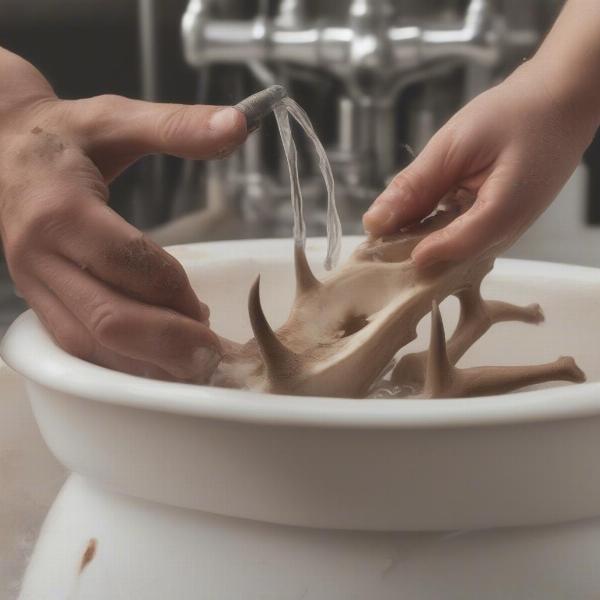Deer bones can be a healthy and enjoyable treat for your dog, providing essential nutrients and mental stimulation. However, preparing them correctly is crucial to ensure your dog’s safety. Improperly prepared bones can splinter, causing serious digestive issues or even becoming lodged in your dog’s throat. This guide will walk you through the steps to safely prepare deer bones for your furry friend.
Understanding the Benefits and Risks of Deer Bones for Dogs
Deer bones are a natural source of minerals like calcium and phosphorus, which contribute to strong bones and teeth. They also offer a satisfying chew that can help alleviate boredom and anxiety, reducing destructive chewing behaviors. However, raw bones pose a significant choking hazard and can fracture your dog’s teeth. Bacteria contamination is another concern with raw bones, potentially leading to illness. Therefore, proper preparation is key to maximizing the benefits while minimizing the risks.
Preparing Deer Bones: A Step-by-Step Guide
Here’s how to safely prepare deer bones for your canine companion:
- Source the Bones: Ideally, source bones from a reputable butcher or hunter who can confirm the deer’s health. Avoid bones from roadkill due to the risk of contamination and disease.
- Clean the Bones: Thoroughly wash the bones with soap and water to remove any dirt or debris.
- Boil the Bones: Place the bones in a large pot and cover them with water. Bring the water to a boil and simmer for at least 2-3 hours. This process softens the bones, making them less likely to splinter, and helps to kill any potential bacteria.
- Cool and Dry: Allow the bones to cool completely before giving them to your dog. Ensure they are thoroughly dry to prevent bacterial growth.
 Washing Deer Bones
Washing Deer Bones
Choosing the Right Deer Bones for Your Dog
Not all deer bones are created equal. Size and density are critical factors to consider when selecting bones for your dog. Large, dense leg bones are generally safer than smaller, more brittle bones. Avoid giving your dog bones that are small enough to swallow whole or that have sharp edges that could cause injury.
Supervising Your Dog with Deer Bones
Even with properly prepared bones, supervision is paramount. Always monitor your dog while they are chewing on a deer bone. If the bone starts to splinter or becomes small enough to swallow, remove it immediately. Provide fresh water to keep your dog hydrated during and after chewing sessions.
Alternatives to Deer Bones
If you’re still concerned about the risks associated with deer bones, several safe alternatives can provide similar benefits. These include:
- Commercial Chew Toys: Many durable chew toys are designed to satisfy a dog’s natural chewing instinct.
- Dental Chews: These chews can help clean your dog’s teeth and promote oral health.
- Frozen Treats: Freezing carrots, bananas, or other dog-safe fruits and vegetables can create a refreshing and stimulating chew.
Conclusion
Deer bones can be a rewarding treat for your dog when prepared and offered responsibly. By following these guidelines, you can help ensure your dog enjoys the benefits of deer bones while minimizing the potential risks. Remember to always prioritize your dog’s safety and consult with your veterinarian if you have any concerns.
FAQ
- How long should I boil deer bones for my dog? Boil the bones for at least 2-3 hours to soften them and reduce the risk of splintering.
- Can I give my dog raw deer bones? No, raw deer bones pose a significant choking hazard and can carry harmful bacteria.
- What should I do if my dog swallows a bone splinter? Contact your veterinarian immediately if your dog swallows a bone splinter.
- Are all deer bones safe for dogs? No, avoid giving your dog small, brittle bones or bones that are sharp.
- How often can I give my dog a deer bone? Deer bones should be given as an occasional treat, not a regular part of your dog’s diet.
- What are some signs that my dog is having trouble with a deer bone? Signs of trouble include gagging, choking, excessive drooling, vomiting, or constipation.
- Can puppies have deer bones? Puppies have developing teeth and jaws and should not be given deer bones.
Related Articles
Find related articles within the website and link them here.
About ILM Dog
ILM Dog is your trusted global resource for all things canine. We provide expert advice and practical information on a wide range of topics, from breed selection and puppy care to senior dog health and training. Our team of experienced writers and dog lovers are passionate about helping you provide the best possible care for your furry companion. Whether you’re a seasoned dog owner or just starting your journey, ILM Dog is here to support you every step of the way. From nutrition and grooming tips to product recommendations, ILM Dog provides comprehensive guidance across all major aspects of dog care. For personalized advice or further assistance, feel free to reach out to our team of experts. Contact us via email at [email protected] or by phone at +44 20-3965-8624. We’re here to help you and your furry friend thrive!